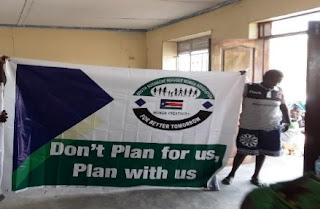5 min inspiration :- Women on strike change the world

For months, refugee women in Uganda had been asking humanitarian actors to move food distribution points closer to where women lived. The women were tired of walking 10 kilometers to get to food and 10 km home, often getting attacked along the way. But the months rolled by, and nothing happened. So women took charge. The Yoleta Women’s Group organized a sit-down strike at the food distribution point, boycotting food distribution. They got men who support women’s rights to write a memo to UNHCR explaining why they were on strike. Now, UNHCR, WFP, and others deliver food directly to communities, and women don’t have to walk. Better yet, everyone in the community sees women as leaders who get things done and gets them involved in humanitarian decisions. Women Lead in Emergencies is a small pilot inside a Global Affairs Canada project supporting South Sudanese Refugees in Uganda from 2018-2020. It worked with 5 local women’s groups to help them build the networks and confid...
